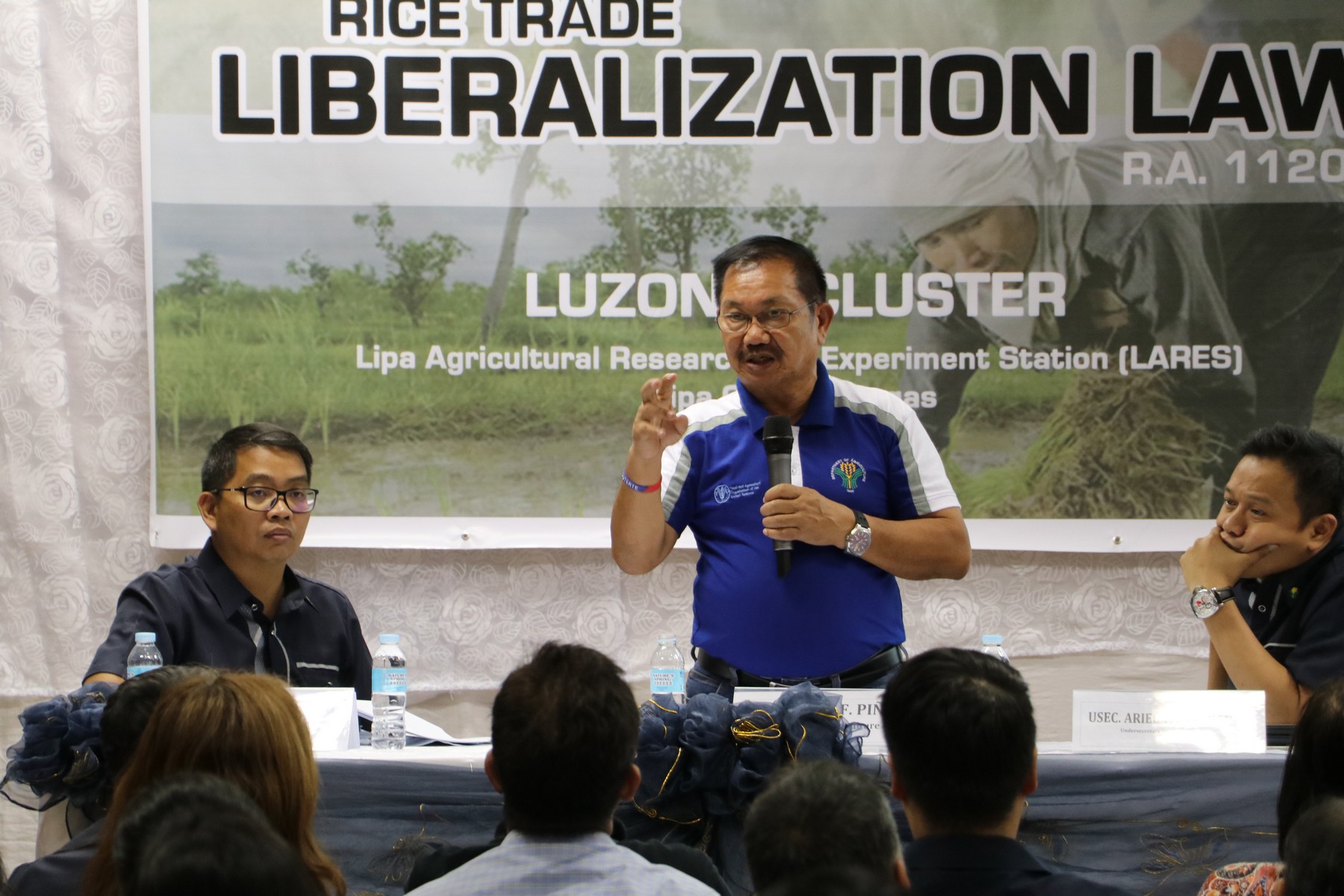Secretary Emmanuel Piñol asked the rice industry to take a leap of faith and support the RA 11203 or the Rice Tariffication and Import Liberalization Law during the Implementing Rules and Regulations (IRR) consultation meeting for South Luzon Cluster (CALABARZON, MIMAROPA, Bicol) at the Lipa Agriculture Research Station in Batangas on February 27.
“This is a leap faith for us, ito po ay isang talon ng pananampalataya…alam kong may dagok ito sa puso niyo… Pagbigyan muna natin ang batas na ‘to at suportahan ang ating Pangulo,” he asked.
During the consultation meeting, stakeholders from the rice industry (traders, millers, farmers’ associations) cannot help to ask to repeal the law, but the Secretary explained that there is no way to do it for the President has already signed it. He emphasized that the only solution is the drafting of the IRR which is the detailed process of how the law will be executed. Thus, the DA with the National Economic Development Authority and National Food Authority conducted a nationwide caravan to consult the different stakeholders from the rice industry to consider their side.
“Ang pwede natin gawin ngayon ay tignan natin sa IRR kung panu natin maisasama sa implementasyon ng batas ang ating mga hinaing, pangamba, at panakot upang magawan natin ng solusyon,” he said.
Farmers shared their fears that the law, which lifts the quantitative restriction (QR) for rice importation, will kill the rice industry of the country. Farmers are afraid that the influx of cheaper rice from other countries would compromise the pricing and the demand for the local rice.
The Secretary assured the farmers that even though he is in favor of the tariffication but like them, he shares the same sentiments, especially with the import liberalization. He apologized that being part of the government he needs to abide the law but promised them that he would always do his best to protect their interest.
DA, NEDA, and NFA also discussed the repealing of the NFA’s role in the rice importation and limiting it to buffer stocking.
“Sa ilalim ng bagong batas and NFA hindi na papayagan na mag-import pa ng bigas. Bibili na lamang sila ng local na palay sa mga local na mga magsasaka. Okay ako do’n upang matigil na ang alingasngas na ang NFA ang nakikinabang at kumikikil ng pera,” he explained.
He also added that he will ask the economic managers that NFA’s buying price should be at P17 with an additional incentive of P3.40 for an individual seller and P3.75 for cooperative. NFA will also be given drying facilities and trucking services for additional services, the Secretary revealed.
Objectives of RA 11203
The Secretary himself also discussed the purposes of the law to clarify it with the stakeholders.
He explained that the removal of the QR had been the country’s commitment to the World Trade Organization (WTO) 20 years ago that if not lifted, the country will be disputed and need to pay the penalty.
It is also to provide affordable rice prices to a greater majority of the population.
With regards to how will the rice industry benefit; the Secretary discussed the Rice Competitiveness Enhance Fund (RCEF). The RCEF will consist of the revenue earned from the importation tariff and will be added to the regular fund of the DA. The RCEF will be divided to 50% for mechanization including solar-irrigation, 30% for rice seed development, propagation and promotion, 10% expanded rice credit access, and 10% for rice extension services.
The imposed tariff will be 35% for ASEAN countries, 40% if within Minimum Access Volume (MAV) for non-ASEAN and 180% if above 350,000 MT from a non-ASEAN country. The country is expecting revenue of Php10-billion or could be higher. With RCEF, it will help the rice industry to be more competitive and reduce the production cost of the farmers.
Furthermore, the export restriction was also lifted which could give local farmers the opportunity to earn more in the world market. Thus, the farmers are encouraged to produce better quality heirloom/traditional rice for exports.
The Secretary has been honest that the law would hurt the rice industry, but he assured the farmers that it would only be at the adjustment period. Thus, he also asked them not to abandon rice farming for there is an expected rapid growth of the population that will translate to higher demand for rice in the world market.
“Hindi tayo pwedeng umasa sa world market kasi kapag dependent na tayo what will stop Thailand and Vietnam from adjusting their prices. Therefore, it is wrong to depend on the importation solely. We have to continue planting rice and DA is here to help you,” he assured the farmers.
In return, farmers expressed their trust to the Secretary but they are afraid that the law would favor some politicians.
Then, the Agri-chief expressed that there is no need to worry about corruption because the President has assured him that the fund will be directly given to DA.
“Dalawang taon na ako sa serbisyo at wala kayong naririnig na corruption cases sa DA,” he said.


